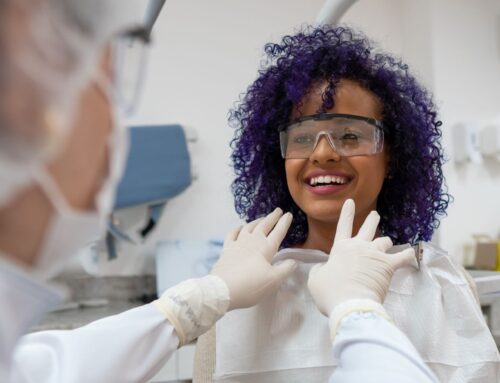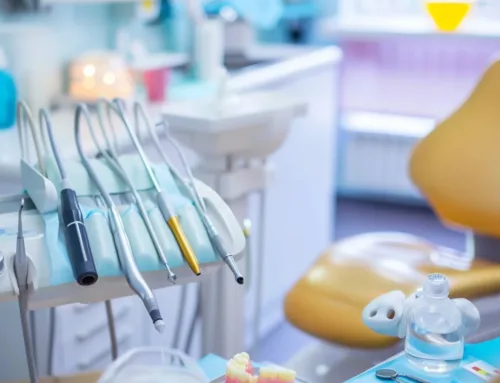How Artificial Intelligence is Transforming Dental Care
Technology is reshaping the world of healthcare, and dentistry is no exception. Artificial Intelligence (AI), once the stuff of science fiction, is now a rapidly growing force in dental clinics, research labs, and patient care systems across the globe. From analyzing X-rays with more precision to designing highly personalized treatment plans, AI is empowering dental professionals to provide faster, more accurate, and more patient-centered care.
At Georgian Dental, we are committed to staying on the leading edge of innovation. Understanding how AI is transforming dentistry helps patients make informed choices and allows practitioners to deliver better results, faster. In this article, we’ll explore how AI is being used in diagnostics and treatment, how it’s improving outcomes for patients, and what the future of AI in dentistry might look like.
What is AI, and Why is it Important in Dentistry?
Artificial Intelligence refers to computer systems that can perform tasks typically requiring human intelligence. In the context of dentistry, AI can:
- Analyze diagnostic images.
- Recognize patterns in patient data.
- Assist in designing treatment plans.
- Automate routine administrative tasks.
- Predict disease progression.
AI’s core strength lies in its ability to process vast amounts of data at a high speed, learning from this data to improve accuracy over time. In an industry where early detection, precision, and personalization are critical, AI’s application in dentistry is a game changer.
Smarter Diagnostics
One of the most revolutionary ways AI is transforming dentistry is in the realm of diagnostics. Traditional diagnostic methods often rely on visual inspections, manual probing, and interpretation of radiographs by dental professionals. While effective, these methods are time-consuming and susceptible to human error.
- AI-Powered Image Analysis
AI can analyze radiographic images like panoramic X-rays, bitewings, and CBCT scans with remarkable precision. Algorithms trained on thousands (sometimes millions) of dental images can identify cavities, periodontal disease, periapical lesions, and even early-stage oral cancers.
Several studies show that AI algorithms can match or even exceed human experts in diagnostic accuracy. For example, convolutional neural networks (CNNs), a type of deep learning AI, have demonstrated up to 95% accuracy in detecting dental caries in digital images.
Interested in learning more? See how AI is transforming dentistry.
- Faster, More Reliable Second Opinions
AI doesn’t get tired or distracted. It can act as a reliable second opinion for dental professionals, helping them confirm their findings or alerting them to potential issues they may have overlooked. This is especially valuable in busy practices or in areas with limited access to specialists.
- Improved Detection of Hidden Pathologies
AI tools are particularly adept at spotting abnormalities that might be difficult to detect with the naked eye, such as bone loss around dental implants, hidden root fractures, or cysts in the jaw. Early detection leads to earlier treatment, which is often less invasive and more cost-effective for patients.
Personalized Treatment Planning
The next frontier for AI in dentistry is in how it helps design and optimize treatment plans tailored to individual patients.
- Leveraging Patient Data
AI systems can analyze a patient’s complete health profile, including dental history, imaging results, genetic factors, and even lifestyle habits, to create personalized treatment recommendations. This helps dentists select the most effective procedures and materials based on what is statistically most likely to succeed for that specific patient.
For example, if a patient has a history of rapid enamel erosion and bruxism (teeth grinding), AI might recommend a specific type of crown material known for durability or suggest early intervention strategies like night guards or dietary changes.
- Orthodontic Treatment with AI
Clear aligner therapy is one area where AI is already widely used. Companies like Invisalign® use AI algorithms to model the progression of tooth movement, simulating different scenarios and helping clinicians choose the most effective and efficient approach.
This technology allows for more predictable outcomes, shorter treatment times, and a better overall experience for patients.
Robotic-Assisted Procedures and Chairside Applications
AI is not just behind the scenes, it’s also taking an active role in treatment delivery.
- Robotic Surgery and Implants
AI-powered robotic arms are now assisting in placing dental implants with extreme precision. These systems use real-time imaging and AI-driven navigation to guide tools within fractions of a millimetre, reducing the risk of human error and improving post-surgical outcomes.
While these systems are still relatively new and costly, they are becoming more common in advanced implantology practices and dental surgery centres.
- CAD/CAM and Restorative Dentistry
Computer-Aided Design and Manufacturing (CAD/CAM) systems have been around for years, but AI is taking them to the next level. AI can now automatically generate accurate 3D models of crowns, veneers, inlays, and onlays based on intraoral scans. The designs are optimized for function, fit, and aesthetics in a fraction of the time it would take a lab technician.
At Georgian Dental, our in-house technology lets us create same-day restorations for many patients, using AI-supported software (https://www.nexusios.com) to ensure both speed and precision.
AI in Preventive Care and Predictive Modeling
Beyond diagnosis and treatment, AI is also being used to help prevent dental disease and predict future oral health issues.
- Predictive Analytics
By analyzing a patient’s age, genetic data, oral hygiene habits, diet, and treatment history, AI can generate a “risk profile” that estimates their likelihood of developing certain conditions in the future. This lets dentists take proactive steps, such as applying fluoride treatments or scheduling more frequent cleanings, to help avoid problems before they start.
- Virtual Oral Health Coaching
Some AI-powered apps can now act as virtual dental coaches. These tools use smartphone cameras to evaluate brushing techniques, identify missed areas, and offer feedback in real time. While these aren’t a replacement for professional care, they can help reinforce good habits between visits.
Administrative Efficiency: AI in Practice Management
AI isn’t just improving care, it’s also transforming the way dental practices run behind the scenes.
- Scheduling and Workflow Automation
AI systems can optimize appointment scheduling based on patient preferences, dentist availability, and procedure durations.
- Billing and Insurance Processing
AI can help verify insurance coverage, auto-fill claim forms, and flag potential coding errors before submission. This reduces administrative overhead and helps patients receive faster reimbursements.
- Enhanced Communication with Patients
AI-powered chatbots can handle common inquiries like appointment reminders, billing questions, and post-op care instructions. This improves patient engagement while freeing up front-desk staff to handle more complex tasks.
AI and Patient Experience
- AI-Powered Virtual Consultations
During the COVID-19 pandemic, tele dentistry took off, and AI made it smarter. Virtual consultations now include automated image analysis and pre-assessments, helping dentists prepare for each appointment more thoroughly. Patients can upload images or videos of their teeth, and AI can provide preliminary findings that help streamline the actual consultation.
- Better Informed Patients
AI can also generate custom educational content for each patient based on their treatment plan, ensuring they fully understand procedures, expected outcomes, and post-care instructions. This level of personalization builds trust and helps patients make better health decisions.
Ethical Considerations and Limitations
While the promise of AI in dentistry is immense, it’s important to address some of the ethical and practical challenges.
- Data privacy – AI systems rely on massive amounts of patient data. Ensuring this data is securely stored and compliant with regulations like PIPEDA (in Canada) is essential.
- Bias in algorithms – If the datasets used to train AI tools aren’t diverse, the algorithms might not perform as well across different patient populations.
- Cost and accessibility – Advanced AI tools can be expensive, which might limit their adoption in smaller practices or rural areas.
At Georgian Dental, we take these concerns seriously and ensure that any technology we implement meets the highest standards for patient safety, privacy, and clinical accuracy.
The Future of AI in Dentistry
Looking ahead, the applications of AI in dentistry will only continue to grow.
- AI and Augmented Reality
Combining AI with augmented reality (AR) will allow dentists to overlay diagnostic data directly onto a patient’s mouth during procedures, helping guide complex treatments in real time.
- AI in Research and Drug Development
AI is being used in oral health research to identify new materials for fillings, analyze genetic links to oral diseases, and even aid in the development of smart biomaterials that can regenerate enamel or fight bacteria.
- Fully Integrated Smart Clinics
Imagine a dental practice where AI systems coordinate patient flow, monitor equipment performance, and even stock supplies based on predicted usage. That’s the future we’re heading toward, where every element of the dental experience is informed by intelligent systems working together.
Learn more about artificial intelligence in oral health.
Georgian Dental Embraces Innovation
At Georgian Dental, we believe in blending cutting-edge technology with compassionate care. Our investment in digital X-rays, intraoral scanners, 3D imaging, and CAD/CAM systems is only the beginning. We continue to monitor advancements in AI with the goal of offering our patients the best and most advanced care available.
We see AI not as a replacement for skilled dentists and hygienists, but as a tool that enhances what we do best: deliver beautiful, healthy smiles.
Artificial Intelligence is already making a profound impact on the field of dentistry, and it’s just getting started. From early diagnosis and smarter treatment planning to robotic-assisted surgeries and seamless patient experiences, AI is transforming how care is delivered.
For patients, this means more accurate diagnoses, shorter treatment times, and better long-term outcomes. For dental professionals, it means more time focused on what matters most, caring for people.
As the future unfolds, one thing is clear, AI isn’t replacing the human touch in dentistry. It’s amplifying it.
Ready to experience the future of dental care?
Contact Georgian Dental today to book your consultation and discover how advanced technologies can elevate your smile.
Appointment Request
If you’re interested in any of our procedures, and would like to meet with one of our dentists to discuss options, costs and get additional information, complete this short form and we’ll give you a call to arrange for a no-obligation appointment at our Barrie clinic.










